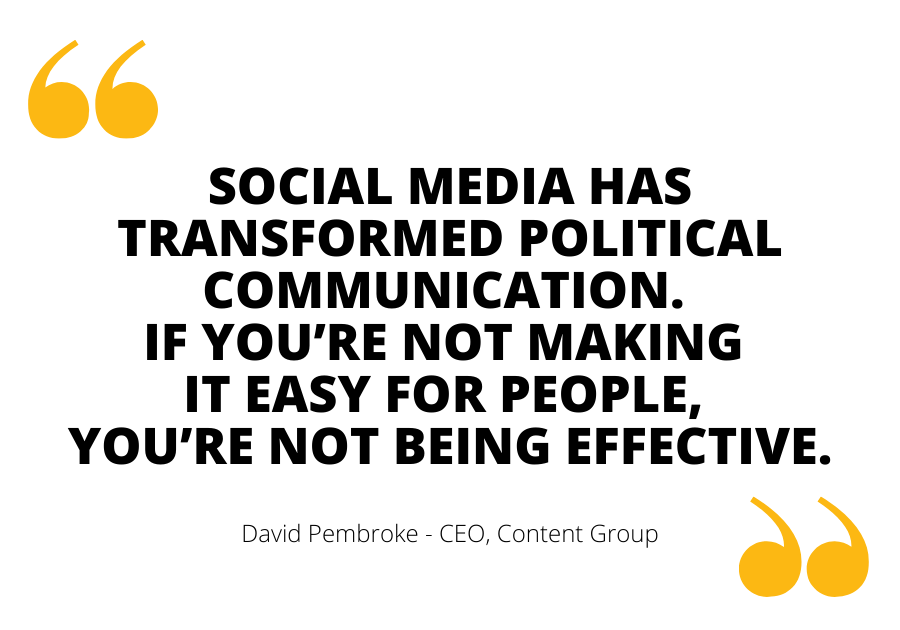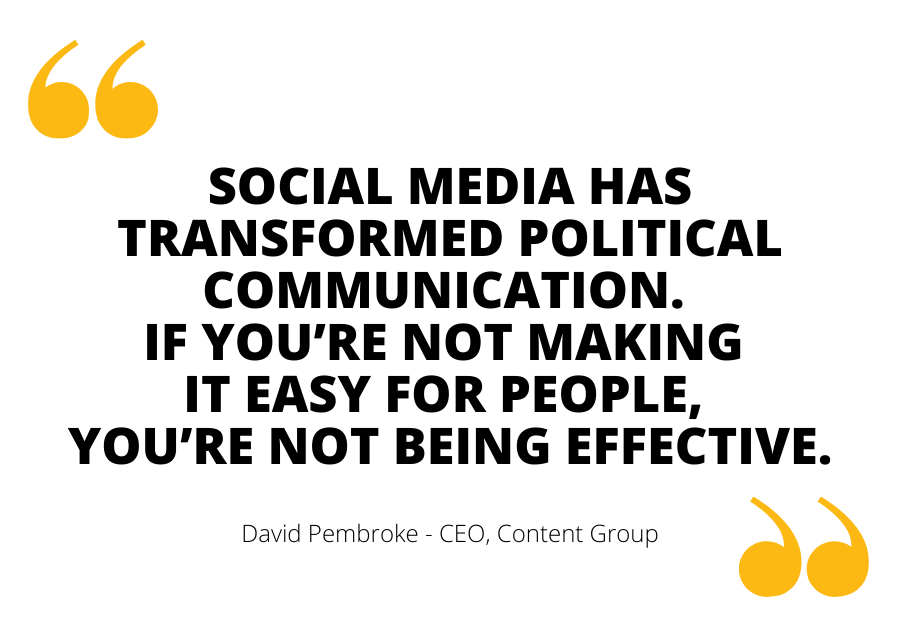Public sector social media: Should leaders be online?
Join your host Roger Christie, and Content Group, CEO David Pembroke as they tackle a question many people working in the public sector are grappling with right now: should leaders be online?
In this episode, we explore:
– the opportunity government leaders have in a digital world;
– the pros and cons of having a personal digital presence;
– the importance of setting a positive online example for up and coming professionals;
– the educative role communications teams can play in supporting leadership teams.

The insights + advice.
Roger Christie: “David, I know this is something that you feel passionately about and we’ve talked about previously, so let’s get straight into our topic today. When it comes to public sector social media, why should leaders have a digital presence and in your eyes, you know, what’s the business case for leaders.”
David Pembroke: “I believe that public sector leaders do need to have a presence for a number of reasons.
1 . The first of those reasons is that the public sector does so much good work. They really do need to get out and tell the story. In this day and age, we need to be in the places where people are spending their time.
We need to be creating the content in the formats that people are consuming content in; explaining the policies, the programs, the services, the regulations that are impacting everyday Australians in the way that people want to receive that information. There’s been a massive transformation in the way that people receive information, and the government has to change with the time – has to modernize and has to be able to get out to tell it’s stories.
2. There’s a second part to it. Public sector or bureaucratic leaders need to be able to send a message to their staff. Often they’re leading many, many thousands of people. I often hear from the people inside the departments that they would love to see their leaders sharing the work that they’re doing and the content that they’re creating. It really gives them a lift to know that their leadership is engaged, is watching, is sharing.
3. The third point – there is often tension between senior bureaucrats and elected political leaders. Where does the responsibility begin? Where does it end? Are you in my lane? Are you taking my story? That tension needs to be negotiated. I think it’s in everyone’s best interest to have those conversations early and to work together with minister, ministerial offices and senior areas of public services, to really understand where that line is. I encourage both sides to get out there and do what it is that you do online so that you can better explain your efforts to the people, but also to receive valuable feedback.
Because often in stakeholder engagement, you need the feedback to better help the design of policy and program. And then to be able to go back to people, to close the feedback loop and say, look, we got your feedback. Thanks very much for that feedback. This is how we’re going to use it. That transaction is increasingly taking place online and is invaluable.”
Digital leadership in practice.
One public sector social media example discussed in this episode that highlights how elected political leaders can work in partnership with bureaucratic leaders is from the Department of Customer Service – Service NSW. Comments made on LinkedIn directed to Minister Dominello are then picked up on and responded to by Secretary Hogan and the CEO of Service NSW, Damon Rees. It’s great to see the interplay publicly through LinkedIn, between ministerial office and bureaucratic office. It’s a really interesting dynamic – it’s using social media to listen, to engage and to respond, and it’s demonstrating leadership across that political spectrum.
> More on this example here: Digital Coalition: An insurance policy for corporate reputation
As David said, “They do it in such a way that really shows that there’s that authentic engagement between the political leadership and the bureaucratic leadership for the benefit of the citizen. They are able to provide the information that they can at the time – but that should be table stakes in this day and age.” David also mentioned Andrew Metcalfe, Secretary of the Department of Agriculture, Water and the Environment – another leader to check out.
David’s final takeaway.
David Pembroke: “There’s an incredible transformation taking place at the moment. The question is: How do political leadership and the bureaucratic leadership collectively work together to be effective, useful, relevant, to create benefit for the citizens? These changes are going to be taking place and they’re going to be widespread and they’re going to be fundamental. We’re going to see big changes in the way public services operate in the next two to three to five to 10 years.
“I encourage all public sector leaders to consider:
– How can we strengthen communities and improve the well-being of citizens through effective communication?
– How can we restore trust in our publicly democratically elected institutions?
“And the way to do that is to get better at listening, get better at taking that feedback into policy and then feeding back to people about what’s happening about the feedback that they’ve been able to give.
“Digital technology is a wonderful enabling transformational vehicle that is there to be used. When it comes to public sector social media, we all understand the risk. We all understand those other things that need to go and need to be considered with it. But if you’re still sitting it out at the moment, maybe it’s time to jump up onto the dance floor and then just start get going!”

“You don’t have to be a genius overnight. Find the community that you’re trying to engage with. Find out where they are. And then turn up with useful, relevant and consistent content and see what happens after that. But you’ll probably find that people will be very pleased that you’ve turned up because often you’re holding on to very valuable information. So let’s, let’s spread it about and let’s use technology, digital technology to spread it about.
To listen to this conversation in full, head to Apple Podcasts, Spotify or wherever you get your podcasts.
Once there, please subscribe, leave a review or drop us a note with any thoughts from this conversation – when it comes to public sector social media for leaders, we’d love to hear from you.